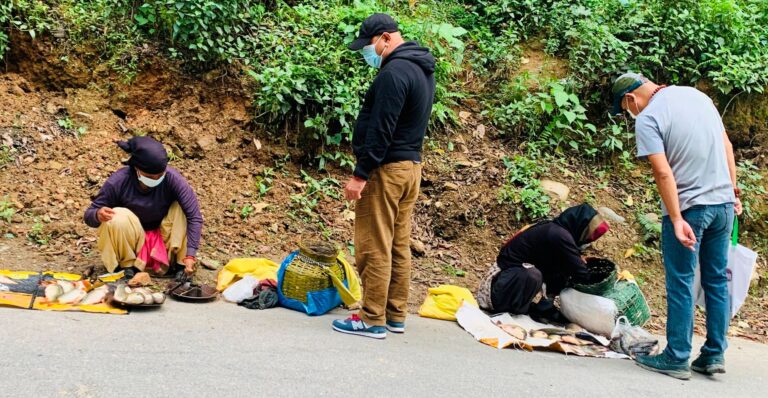
In Khapaudi of Pokhara women fish hawkers (Jalari) carry their fishes to Lakeside early in the morning. Selling fishes along with being their daily means of livelihood is also their ancestral occupation. During the morning on their way to the Lakeside various people going for morning walks to buy their fish.
There is a community consisting of 90 families of fish hawkers that live in and around the Fewatal and Khapaudi. The fish hawkers have expressed their grievance by saying that they do not have an organised place to sell their fish.
Goma Jalari a fish hawker who was selling fish near Fewatal has said that she always has to sell her fishes on the streets. “I can’t sell in the bazaar as there is no organised place for me to sell. If I sell in front of a house the house owners always chase me away. Even if I clean the space they always scold me. I have to face violence,” She vented.
At night the fish hawkers lay their nets and sell the fishes trapped in the nets during the daytime. It is their daily livelihood. The fish hawkers travel around and sell to people who want to buy the fishes.
Samjhana Jalari, another fish hawker recalls that she has been scolded by various homeowners for dirtying around the place she sold her fish. She further mentioned that some time ago many fish hawkers used to sell their fishes in Khahare Chowk but the local residents chased the hawkers away. “The local residents kept scolding us to leave the area and ultimately the Mothers’ Group (Aama Samuha) managed to kick us out,” She added.
The fish hawkers have expressed their hardships by saying that it is their ancestral profession and that they cannot leave their profession due to their ancestral obligation as well as the fact it is difficult to do so. The fish hawkers want a designated place to sell their fishes.
“Our grandparents too did the same work. Ever since my marriage, I have selling fishes and it has been 11 years. I don’t have any different source of income,” Samjhana Jalari added.
She has also said that sometimes they are able to catch around 10-12 kg fishes and sometimes it is only 2 or 3 kg and sometimes their nets are completely empty. On such occasions why they have no catch, they buy fishes from others. After selling their fishes for two hours they earn around 500 – 1000 rupees from which they have to manage their households.
Unconcern of local government
For the collection of fishes, a cooperative bank named Harpan Fewa Matsya Sahakari Sansthan has been made which has 13 shareholders. Currently the cooperative is shut. The Chairperson of the cooperative bank Indra Jalari has said that they have been asking for land to sell fishes from the provincial government for the last six years but it has all been in vain.
“It is difficult to sell our fishes from house to house so we have been asking for a plot of land from the provincial government, a place where all fish hawkers can sell their fishes collectively. However we have not been able to get the attention of the government in order to improve our existing conditions even though we do pay our taxes to the state,” Chairperson Jalari said.
Chairperson Jalari further added that currently all hotels and restaurants have been shut due to the prohibitory order so it has been difficult for us to make sales. In the previous prohibitory order, fish hawkers were only allowed to fish once a week. This adversely impacted our livelihood so since the last Sunday we have been allowed to fish every day.
He also mentioned that winters are more suitable for fishing as they catch more fishes and the least during monsoons. During winters around 80 homes lay their nets and catch 200 kgs of fishes on a daily basis. In Pokhara Metropolitan City’s ward n. 6, 18, and 24 there are 90 families of fish hawkers. In Fewatal currently, there are Tilapiya (Tilipiya), Rewa, Golden Mahseer (Sahar Kade), Bhittha, Eels (Bam), and Pakeheta Macha species of fishes available.










Source : THE RISING NEPAL, Photo : TRN,






